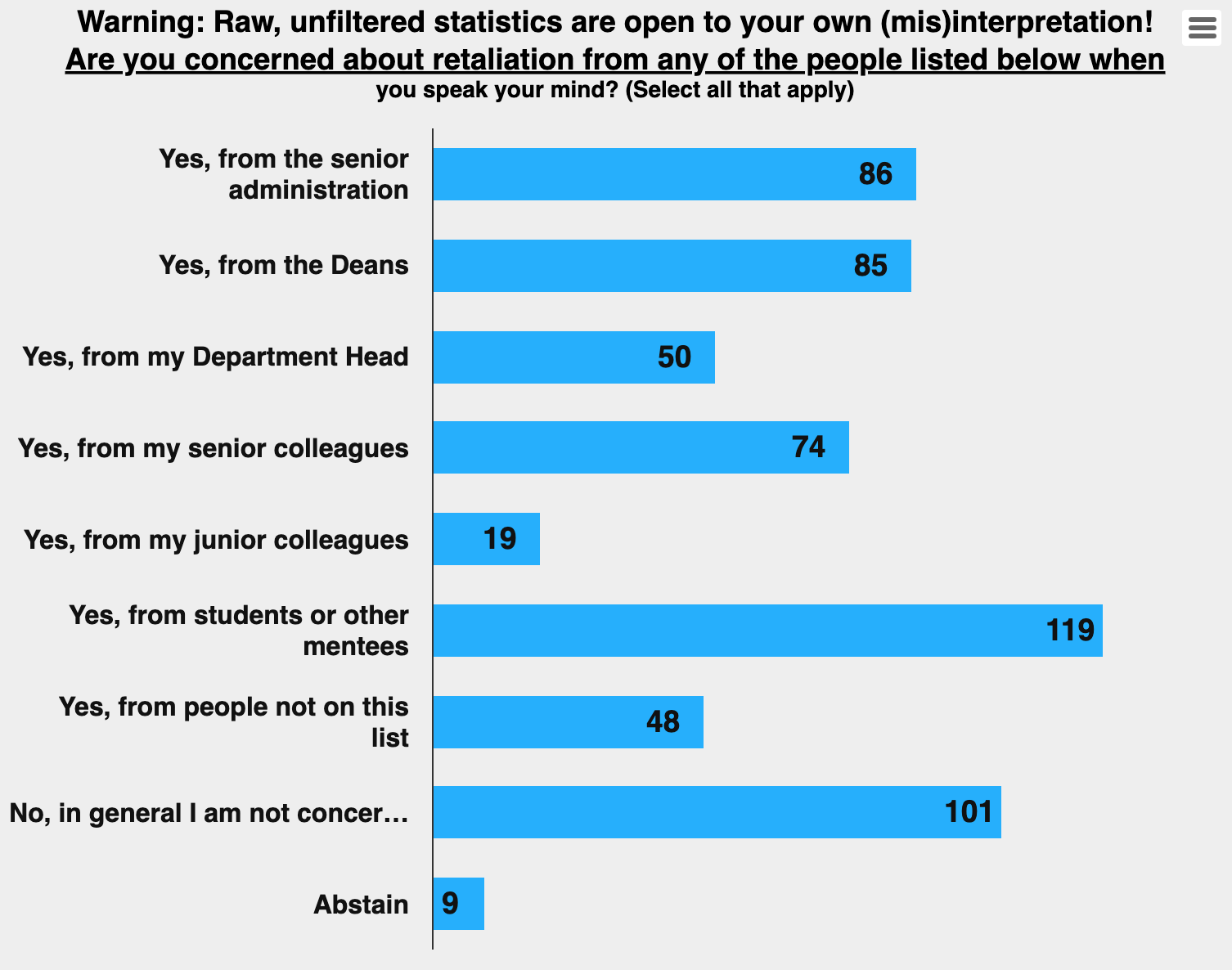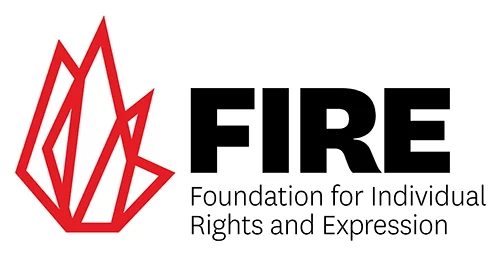Faculty Polls
Faculty Polls on Free Speech
Faculty Meeting Poll in 2021
In October 2021, MIT canceled the invitation of UChicago geophycist Dorian Abbot to talk about planetary atmospheres because, regarding college admissions, he argued that personal identity should not supersede merit. The barrage of negative press and public outrage from MIT's cancelling Dr. Abbot led MIT to hold two faculty forums1 2, at which faculty chair Lily Tsai polled faculty attendees on two questions.
More than half responded "Yes" to "Do you feel on an everyday basis that your voice, or the voices of your colleagues, are constrained at MIT?"3
About 80% responded "Yes" to "Are you worried given the current atmosphere in society that your voice or your colleagues' voices are increasingly in jeopardy?"4
That a large majority of polled MIT faculty felt their voices are constrained at MIT reveals that the Abbot Cancellation was not an isolated event and that a crisis of self-censorship exists on campus.
1 on Wednesday, October 27, 2021 and Wednesday, November 3, 2021.
2 The first forum had about 100-120 faculty attending; the second, for those who could not attend the first, had about 50-60.
3 At the first meeting, 52% voted yes. At the second, it was 60%.
4 At the first meeting, 77% voted yes. At the second, it was 79%.
Faculty Adoption of the Statement on Freedom of Expression in 2022
After the faculty Ad Hoc Working Group (AHWG) issued their report in September, 2022, and months of subsequent deliberation in faculty forums, the MIT faculty adopted the Statement on Freedom of Expression and Academic Freedom in December, 2022. Of the over 1,000 MIT faculty members, 150 attended the meeting to vote on the Statement. The vote was 98 to adopt the Statement, and 52 voted against adoption.
The 52 faculty members who voted against the Statement represent a core opposition to freedom of expression and academic freedom at MIT. These opponents are still at the Institute, although their speech suppression activities have become less visible. The low number of faculty who participated in the deliberations and who voted on the Statement probably do not reflect apathy so much as fear of retaliation from these active opponents of free speech at MIT.
FIRE 2023 Institutional Health Report
In 2023, the Foundation for Individual Rights and Expression (FIRE) released a report on MIT’s Institutional Health, the first such report FIRE has issued comprehensively evaluating the culture of free expression at a particular institution. The report includes a survey of 195 MIT faculty for the report, finding a high degree of concern for free expression at the institution. The report conclusions are highlighted separately on our website.
Pulse of the Faculty Poll in 2024
The Pulse of the Faculty is an independent, faculty-run, weekly poll of the MIT faculty that has been operating since January. Polling questions are submitted and prioritized by the faculty for polling. Only MIT faculty participate in this process.
The Pulse is simply a poll of the roughly 1,100 faculty members at MIT. Although typical poll response rates are 20% to 25% of the entire faculty, poll respondents self-select. Consequently, the poll results are not a statistically valid survey representation of the entire faculty. The Pulse is better characterized as an indication of issues that a meaningful group of the faculty believe should be discussed, and what position a concerned portion of the faculty have on the issues.
Towards the end of the 2024 spring semester, the Pulse polled the faculty on the following question: Are you concerned about retaliation from any of the people listed below when you speak your mind? 320 members of the faculty responded to this poll. At a 29% response rate, this poll had the highest faculty participation in the history of the Pulse.
The results indicate that a significant portion of the faculty are still concerned about retaliation within MIT for freely expressing their viewpoints. The feared sources of retaliation come from all quarters – the students (37% of respondents), the MIT administration (27%), and senior academic leadership (27%). Overall, 68% of the faculty are concerned about potential retaliation from at least one source.
The poll is not a statistical representation of the overall faculty, but both the response rate and results of this poll indicate a significant continuing problem at MIT. Although the Statement on Free Expression and Academic Freedom has been Institute policy for over a year, there is still much work to do to correct a culture of self-censorship and implicit speech suppression.

FIRE 2024 Faculty Survey
In 2024, FIRE conducted their first survey of faculty at four-year colleges and universities. Titled "Silence in the Classroom," this initial survey covered over 6,000 faculty members at 55 campuses. Unfortunately, MIT was not included in the study, but the findings generally agree with the situation on the MIT campus, in which a significant portion of the faculty self-censor on a range of topics from fear of retaliation from inside their university.
